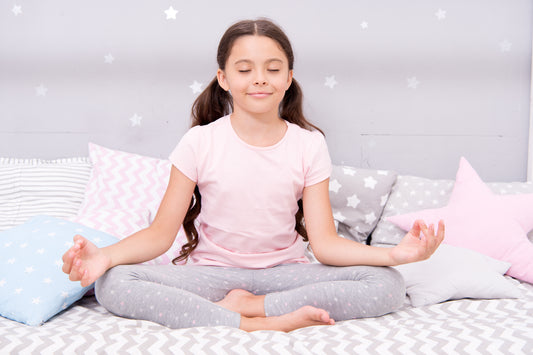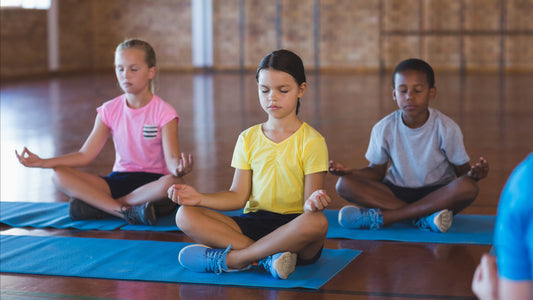In today's fast-paced world, where children's schedules are often packed with school, extracurricular activities, and social engagements, finding moments of quiet and stillness can be a challenge. Yet, amidst the hustle and bustle, the importance of fostering inner peace and emotional well-being in our children remains paramount. Meditation, an ancient practice rooted in mindfulness and self-awareness, has emerged as a powerful tool for both adults and children, offering a pathway to cultivate calm and enhance emotional regulation. But when is the best time of day for kids to meditate?
The Ideal Time for Young Meditators
The ideal time for meditation varies depending on the child's age, temperament, and daily routine. While there is no one-size-fits-all approach, general guidelines can provide a starting point for parents embarking on their child's meditation journey.
Preschoolers (Ages 3-5)
For preschoolers, who are still developing their sleep patterns and daily routines, incorporating meditation into their existing schedule can be beneficial. Consider incorporating meditation after nap time or before bedtime. Engage them with playful techniques, such as guided visualizations, breathing exercise cards or interactive games, to make meditation a fun and enjoyable experience.
School-Aged Children (Ages 6-12)
As children progress through school, their attention span and understanding of meditation deepen. Aim for meditation sessions of 5-10 minutes, ideally twice a day, once in the morning to set a positive tone for the day and again in the evening to promote relaxation before sleep.
Teenagers (Ages 13-18)
Teenagers, with their evolving emotions and heightened self-awareness, may benefit from longer meditation sessions of 10-20 minutes. Encourage them to incorporate meditation into their daily routine as a personal practice for self-discovery and stress management.
Key Considerations for Choosing the Best Time to Meditate
-
Consistency: Regularity is key to reaping the full benefits of meditation. Encourage your child to make meditation a consistent part of their daily or weekly routine, even if it's just for a few minutes each time.
-
Individual Needs and Preferences: Adapt the timing of meditation sessions to suit your child's individual needs and preferences. Consider their energy levels, sleep patterns, and daily schedule when determining the most suitable time for meditation.
-
Flexibility: Be flexible and open to adjusting the timing of meditation sessions as your child's needs and preferences evolve.
-
Enjoyment: Encourage your child to experiment with different times of day to find when they feel most comfortable and engaged with meditation.
Exploring Different Times for Meditation
While the benefits of meditation are evident, finding the right time of day can make a significant difference in your child's experience. Here are some options to consider:
-
Morning Meditation: Starting the day with meditation can set a calm and focused tone for the hours ahead. It can help children manage stress, improve focus, and cultivate a sense of presence.
-
After-School Meditation: After a busy day at school, meditation can provide a much-needed opportunity for relaxation, stress relief, and emotional regulation.
-
Before-Bed Meditation: Practicing meditation before bed can promote relaxation, improve sleep quality, and reduce anxiety.
-
Weekend Meditation: Weekends offer a more relaxed schedule, providing an opportunity for longer meditation sessions and exploring different techniques.
Nurturing a Love for Meditation
As parents, we play a crucial role in nurturing a love for meditation in our children. Here are some tips to encourage regular practice:
-
Set the Example: Children often emulate their parents. Incorporate meditation into your own routine to demonstrate its value and set a positive example.
-
Create a Meditation Space: Designate a quiet and comfortable space where your child can meditate without distractions.
-
Explore Different Techniques: Experiment with various meditation techniques, such as guided visualizations, mindfulness exercises, or yoga, to find what resonates with your child.
-
Make it Fun: Incorporate playful elements into meditation sessions to keep your child engaged and motivated.
-
Celebrate Progress: Acknowledge and celebrate your child's progress, no matter how small, to reinforce their efforts and foster a sense of accomplishment.
Remember, meditation is a journey, not a destination. Each child's path to mindfulness will be unique. By providing a supportive and encouraging environment, we can empower our children to discover the transformative power of meditation and cultivate inner peace that will serve them well throughout their lives. Learn more about how our complete Meditation Kits for kids can help your family started in their meditation journey.




